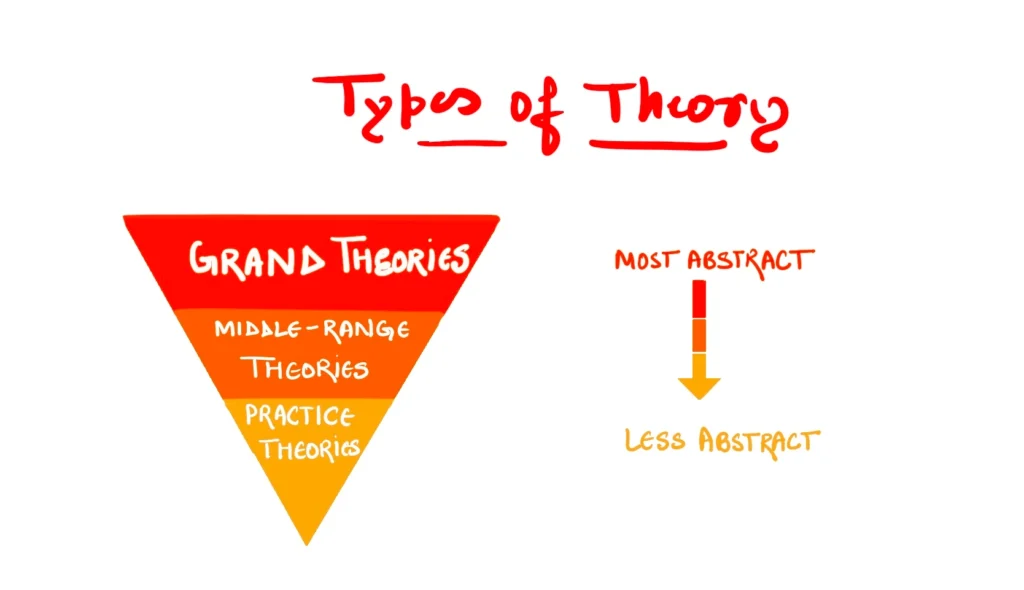Middle range theories were introduced by Robert K. Merton to make scientific research more practical and focused. Instead of trying to explain everything broadly, like grand theories, or only looking at small details, these theories focus on specific topics that can be tested and understood. They help connect general ideas to real-life situations, making it easier for researchers to study and solve everyday problems. First used in sociology, middle range theories have since been applied in areas like healthcare and education to understand patterns and predict outcomes in specific situations.

A simple example of a middle range theory is the idea that people are more likely to recycle if they have easy access to recycling bins. This theory focuses on one specific behavior—recycling—and connects it to a practical factor, like convenience. It doesn’t try to explain all human behaviors or the entire environmental movement, but it helps researchers and communities figure out how to encourage recycling in everyday life. Now, that’s an oversimplification of middle range theory but to get an idea its important to focus on extremes.
The Origin and Purpose of Middle Range Theories
Middle range theories were developed by Robert K. Merton in the mid-20th century as part of his effort to address the limitations of grand, overarching theories and overly specific empirical studies in sociology. At the time, sociology was grappling with two extremes: highly abstract theories that attempted to explain all aspects of human behavior and highly localized studies that lacked broader application. Merton saw the need for a middle ground—a way to connect theory with empirical research in a practical, testable manner. This approach was shaped by the growing emphasis on scientific rigor and the demand for research that could address real-world social issues.
Robert K. Merton’s Work and His Contribution to Sociology
Merton was engaged in several important works when he introduced middle range theories. He was exploring the sociology of science, including how scientific norms and practices influence research and discovery. His famous work on the “normative structure of science” outlined principles like communalism and organized skepticism, which are still foundational to understanding scientific behavior today. Additionally, he was examining the social consequences of technological innovations and the unintended outcomes of social actions, which reflected his interest in linking theory with observable phenomena.
How Social Scientists Responded to Middle Range Theories
Merton’s middle range theories were initially met with mixed reactions. Some social scientists appreciated their practicality and saw them as a way to make sociology more empirical and actionable. Others criticized them for being too limited in scope compared to grand theories. Despite this, middle range theories gained traction as they provided a framework for solving specific problems while maintaining theoretical depth.
Key Middle Range Theories Developed by Robert K. Merton
Among Merton’s own middle range theories were several that became highly influential. For example, his theory of reference groups explained how individuals evaluate themselves by comparing themselves to specific groups, influencing their attitudes and behaviors. Another was the self-fulfilling prophecy, which described how a belief or expectation could bring about the very result it predicted. His strain theory of deviance explored how societal pressures can lead individuals to commit deviant acts when they lack the means to achieve culturally accepted goals. These theories exemplified Merton’s ability to connect abstract ideas with real-world phenomena, demonstrating the practical power of middle range theories.
FAQs
What are middle range theories?
Middle range theories are specific, testable frameworks that bridge the gap between broad, abstract theories and detailed empirical studies. They focus on particular aspects of human behavior or social phenomena, making them practical for real-world application.
Who developed middle range theories?
Middle range theories were developed by sociologist Robert K. Merton in the mid-20th century to address the limitations of overly broad and narrow theories in social science research.
Why are middle range theories important in social science?
Middle range theories provide a balance between abstract, grand theories and specific empirical studies. They are essential because they offer practical insights into social phenomena and can be tested with real-world data, making them more applicable to research and policy.
How do middle range theories differ from grand theories?
Grand theories aim to explain all aspects of human behavior or society, often in very broad terms. Middle range theories, on the other hand, focus on specific, testable concepts and are more focused on practical, observable phenomena.
Can middle range theories be applied to all disciplines?
While middle range theories originated in sociology, they have been successfully applied in other disciplines such as psychology, healthcare, education, and management to study specific, real-world issues.
What are some examples of middle range theories by Robert K. Merton?
Some notable middle range theories by Merton include the self-fulfilling prophecy, which explains how expectations can influence outcomes, and strain theory, which addresses how societal pressures lead individuals to deviance when they cannot achieve cultural goals.
What is the significance of middle range theories in modern research?
Middle range theories are widely used in modern research because they offer a practical way to explore specific aspects of human behavior and social phenomena, making them valuable for testing hypotheses and informing policy decisions.
How are middle range theories tested?
Middle range theories are tested through empirical research that focuses on specific, observable variables. Researchers collect data through experiments, surveys, or case studies to confirm or challenge the validity of the theory.
Can middle range theories be expanded into broader theories?
While middle range theories are focused on specific areas, they can sometimes serve as building blocks for developing broader, more comprehensive theories once enough evidence has been gathered to support generalizations.
What are the limitations of middle range theories?
Although middle range theories are practical and testable, they may not always capture the complexity of larger social or cultural systems. They are designed to address specific questions and may not provide a complete explanation of a broad phenomenon.
